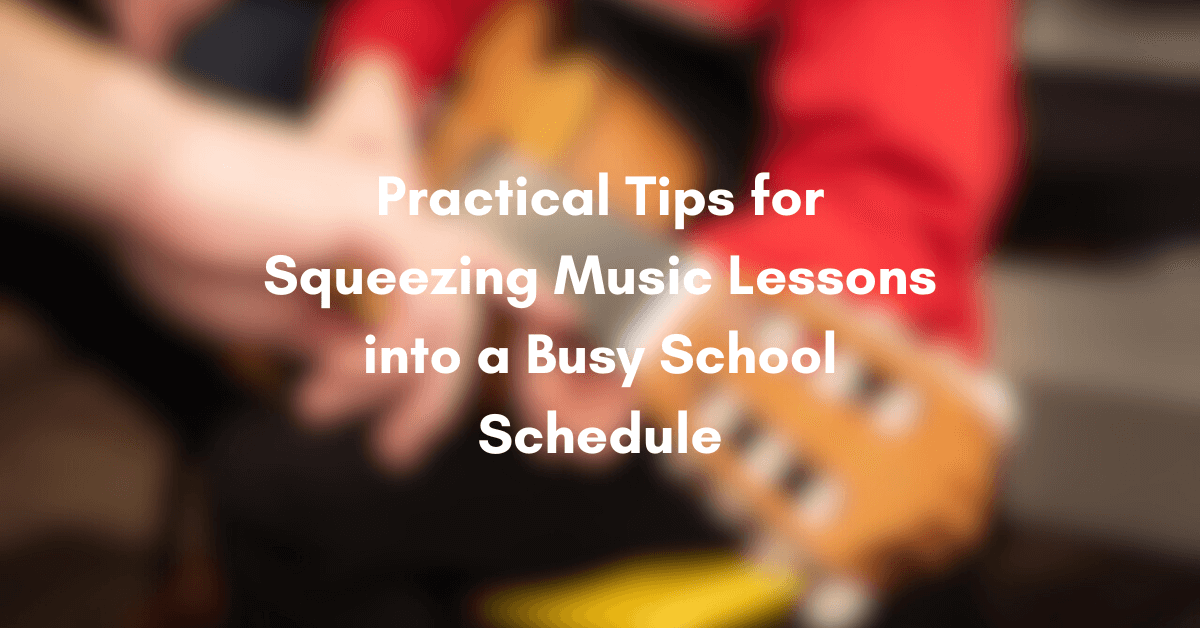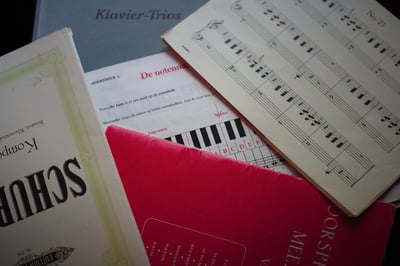Practical Tips for Squeezing Music Lessons into a Busy School Schedule
September 27th, 2023
4 min read

Music lessons offer lots of positives for your child. But with after-school clubs, dance classes, sports, and a stack of other activities to juggle, how can you squeeze it in?
As parents, we all want to provide our children with the best possible start in learning. Music, in particular, offers numerous cognitive, emotional, and social benefits. However, juggling music lessons alongside a packed school schedule can be a challenge for any parent or guardian.
In this article, we'll explore some practical tips to help you find some harmony between music education with your child's daily routine. By finding the right balance, you can enrich their lives with the gift of music while still excelling at school (and, who knows, maybe give yourself some downtime!)

1. Set realistic goals and priorities
Before diving straight into music lessons, it's essential to put your child's interests first and set achievable goals. Discuss with your child what instrument or genre of music they're passionate about. You might be surprised by their answer! Once you've determined their interests, work with them to set realistic goals. Maybe it's to tackle one of the songs that they've been listening to in the car, or watching an introductory video online. Keeping things simple, particularly before lessons kick in, will help to keep that initial spark of making a sound burn bright.
2. Sync music lessons with school activities
Ok, this is a dark art and requires meticulous planning, but finding a balance between other school activities and music could be the difference between stress and success. To fit your child's music lessons into a busy school schedule, consider coordinating them with other school-related activities. Some preemptive parents may even go down the spreadsheet route. But by keeping your schedule as consistent as it can be, you can avoid creating conflicts and reduce rushing between activities.
3. Try online music lessons for flexibility
Online music lessons have become increasingly popular and offer flexibility that traditional in-person lessons may not provide. Online lessons remove commuting, which can offer unpredictability and affect your schedule, allowing your child to take lessons from the comfort of home. Online lessons also give you a wider selection of tutors to choose from, making it easier to find the perfect fit for your child's musical goals.
4. Combine learning styles
Look for opportunities to integrate music into your child's daily learning routine. For example, they can practice counting and fractions by understanding rhythms, or learn about history through the study of musical eras and composers. Combining music with other subjects not only saves time but also reinforces their overall education: after all music can help with numeracy and literacy!
5. Create a consistent practice schedule
Consistency is key when it comes to practicing an instrument. Work with your child to establish a regular practice schedule that complements their school routine. Setting aside dedicated practice time, even if it's just 15-30 minutes a day, can lead to significant progress over time. A consistent practice routine will help your child build discipline and improve their musical skills.
/Carol_Square.jpg?width=400&height=400&name=Carol_Square.jpg)
6. Use instruments from your child's school
Many schools offer music programs or access to musical instruments. Take advantage of these resources to reduce the demands on your family's time and budget. Your child might be able to participate in school bands, orchestras, or choirs, allowing them to receive musical education during the school day. Even digital pianos can be brought home from school if they are portable!
7. Encourage time management skills
Teaching your child to manage their time is a life lesson that will benefit their musical pursuits. Help your little one to create a weekly schedule that allows time for homework, music, extracurricular activities, and, most importantly, well-being and relaxation. By learning to manage their time effectively, they'll be better equipped to balance their commitments.
8. Set realistic expectations
It's important to set realistic expectations for your child's progress in music. If you are musical yourself, it can sometimes be difficult to let your child learn from their mistakes. If you aren't musical, you might be frustrated at yourself for not feeling that you can offer practical help. Understand that their musical journey will have ups and downs and that progress may be slower during busy school periods. Music is about expression, creativity, and release: that should always be the primary goal, to make a sound and have fun!
9. Involve the school in music education
Engage with your child's school to explore how they can support your child's music education. Many schools value music in their curriculum, particularly for the mental health benefits it can bring to the classroom. Finding out about after-school clubs, music societies, and more can help your child develop (and save extra car trips and commuting nightmares for you!)
10. Use apps and technology to learn music
Alongside music lessons at school, clubs, private tuition, and online lessons, you can also save time by using music learning apps. There are lots of neat ways that AI technology is used to teach music, and it gives kids access to music learning at home or even on the go! There are also instruments that teach kids musical theory, so make the most of technology and help your child's progression!

Fitting music lessons into a busy school schedule is tough but it can be done. The benefits of music extend beyond the four walls of the classroom: music can improve your child's emotional well-being, improve their performance in other areas, and allow them to build new relationships and make friends. By placing emphasis on your child's musical interests, setting realistic goals, and using the resources available, you can provide them with a well-rounded education that includes the invaluable gift of music (and make a little time for yourself as well!)
- If you need advice on finding music lessons for your budding rockstar, we can help.
- Want to learn more about how AI tools can teach music? Check out our article!
- Soundbops can help your child learn music at home and boost their musical theory knowledge. And with the supported resources, even parents and guardians without music skills can help!
Adam is the Content Manager at pBone Music. This should mean that he’s the ideal person to write about himself, but he finds boasting in the third person a little awkward. He honed his word wizardry with a degree in English Language and Literature at the University of Leeds. He has since written copy for clients and businesses across the land, from awards to something beginning with “z”. He also spent a number of years as a musician. He has written pop songs and even jingles for kids, performed more first dances at weddings than you could shake a pBuzz at, and once played a gig for a pie company at The Etihad Stadium in Manchester. When he’s not reminiscing about those good old days, you might find Adam enjoying the football (although as an Everton fan, that can be difficult). He also loves spending time with his partner, Jen, and his family and friends, and sincerely hopes they feel the same way.
Topics: